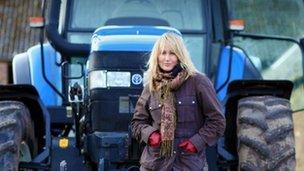'Slipper farmers' harvest money
- Published
I've always known I wanted to be a journalist, but over the last few months I've taken on a new - and potentially more lucrative - career.
I've become a farmer.
Now I haven't had to buy any livestock, or grow any crops.
Instead I've joined the select ranks of those sometimes called 'slipper farmers'.
That's because they've found a way to claim farming subsidies without actually working the land.
Now, bear with me because it took me a while to get my head around this as well.

A loophole allows town-dwellers to make money from farming
Basically, farmers can sell the right to claim subsidies to anyone they like.
And we found speculators who had bought that right as an investment.
They rent empty land and, as long as it's maintained in good condition, they don't have to produce any food. Or farm in any way.
In fact if they rent hill ground - of which there is a plentiful supply in Scotland - they can just leave it alone.
They get paid every year in the form of a subsidy cheque from the government, and the farmer they bought it from gets a lump sum up front. It's a classic secondary market.
I decided to get a piece of the action.
All that meant was a little form filling and then buying a small subsidy entitlement at auction. I didn't even have to leave the comfort of my own home, instead logging onto a live auction website.
A few clicks, a couple of bids and there you go - I'm a farmer.
Now, I only dipped my toe in the water, but some investors have sunk millions into entitlements and we've been told they could see an annual return of up to 30%.
Which does make me think - am I in the wrong game altogether?
The people who will have done best from the system are those who bought in early - just after the loophole emerged in 2005.
And if you want to follow my example, you had better get your skates on. The European Commissioner for Agriculture and the Scottish Cabinet Secretary for Agriculture both told me they're determined to close the loophole when the whole subsidy system is reformed in 2014.
- Published5 March 2012